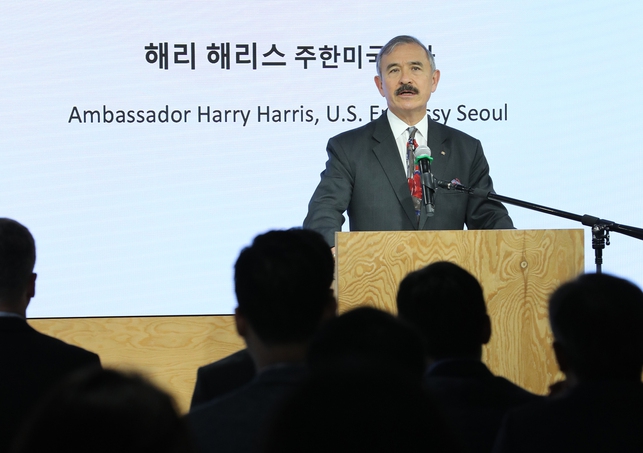Posted on : Jun.7,2019 17:00 KST
 |
|
US Ambassador to South Korea Harry Harris makes a keynote address at an event organized by the US Embassy in South Korea and the Korea Internet Corporations Association at Facebook Korea in Seoul on June 5.
|
The conflict between the US and China is intensifying. As the trade war between the two powers begins looking more and more like a battle for dominance, South Korea is facing very real pressure to decide which side it is on. It already has the past experience of permitting the deployment of US strategic weapons – the Terminal High Altitude Area Defense (THAAD) system – only to end up facing harsh economic retribution from China. Now there are great concerns that we could end up “sandwiched” once again, caught between the two major powers and forced to make an undesirable choice. The government needs to respond wisely and develop a suitable response plan before it’s too late.
During a June 5 event organized by the US Embassy in South Korea and the Korea Internet Corporations Association, US Ambassador to South Korea Harry Harris referred to 5G network cybersecurity as a key element in protecting allies’ communications, stressing that the choice of untrustworthy suppliers to cut costs in the short-term would result in very large risks and costs in the long term. While he did not single any company out by name, it amounted to a demand that South Korea avoid using communications equipment from the Chinese company Huawei. It was the first time a senior US official openly discussed the issue.
So far, the South Korean government has been circumspect on the question of whether it would use Huawei equipment, insisting that it was a “matter for individual companies to decide.” But as the US-China conflict becomes increasingly overt, South Korea will soon be facing a situation where remaining neutral is no longer an option. Referring to the possibility of China halting rare-earth metals, the US Commerce Department previously dismissed the possibility of South Korea breaking ranks on China with its insistence on greater coordination with “Canada, Australia, the European Union, Japan, and South Korea.”
China, which has been signaling its own firm commitment to resisting these moves, is also pressuring South Korea not to side with the US. Meeting recently with a visiting delegation of South Korean reporters in China, a Chinese Foreign Ministry Official said the South Korean government would “need to make the right determination” on the US-China trade conflict. Beijing has also been ratcheting up the pressure with stronger review conditions on commercial visas for South Korean nationals as of this month. It’s a time when strategic actions and choices are more important than ever to avoid the fate of being crushed between the US and China behemoths.
Late last month, Prime Minister Lee Nak-yeon predicted that “developments in US-China relationships will have a broad-ranging impact on us beyond the issues of the trade war and Huawei,” ordering the Ministry of Foreign Affairs to set up an exclusive organization to address the matter. South Korea is obligated to find a point of compromise between the US and China, using what is best for the national interest as its guide. If necessary, it should work to establish a pan-governmental response posture, including the establishment of a dedicated government organization on the issue.
Please direct comments or questions to [english@hani.co.kr]






